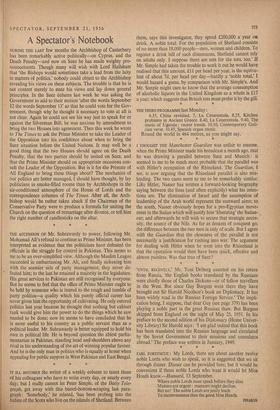A Spectator's Notebook
DURING THE LAST few months the Archbishop of Canterbury has been remarkably active politically—on Cyprus. and the Death Penalty—and now on Suez he has made weighty pro- nouncements. Though many will wish with Lord Hailsham that 'the Bishops would sometimes take a lead from the laity in matters of politics,' nobody could object to the Archbishop revealing his views on these subjects. The trouble is that he is not content merely to state his views and lay down general principles. In the Suez debates last week he was asking the Government to add to their motion 'after the words September 12 the words September 13' so that he could vote for the Gov- ernment, though why he thought it necessary to vote at all is not clear. Again he could not see his way just to speak for or against the Silverman Bill; he was anxious by amendment to bring the two Houses into agreement. Then this week he wrote to The Times to ask the Prime Minister to take the Leader of the Opposition into his confidence about when to bring the Suez situation before the United Nations. It may well be a good thing that the two Houses should agree on the Death Penalty, that the two parties should be united on Suez, and that the Prime Minister should on appropriate occasions con- sult the Leader of the Opposition. But is it for the Primate of All England to bring these things about? The mechanics of our politics are better managed, I should have thought, by lay politicians in smoke-filled rooms than by Archbishops in the air-conditioned atmosphere of the House of Lords and the correspondence columns of The Times. After all, the Arch- bishop would be rather taken aback if the Chairman of the Conservative Party were to produce a formula for uniting the Church on the question of remarriage after divorce, or tell him the right number of candlesticks on the altar.
* *


































 Previous page
Previous page